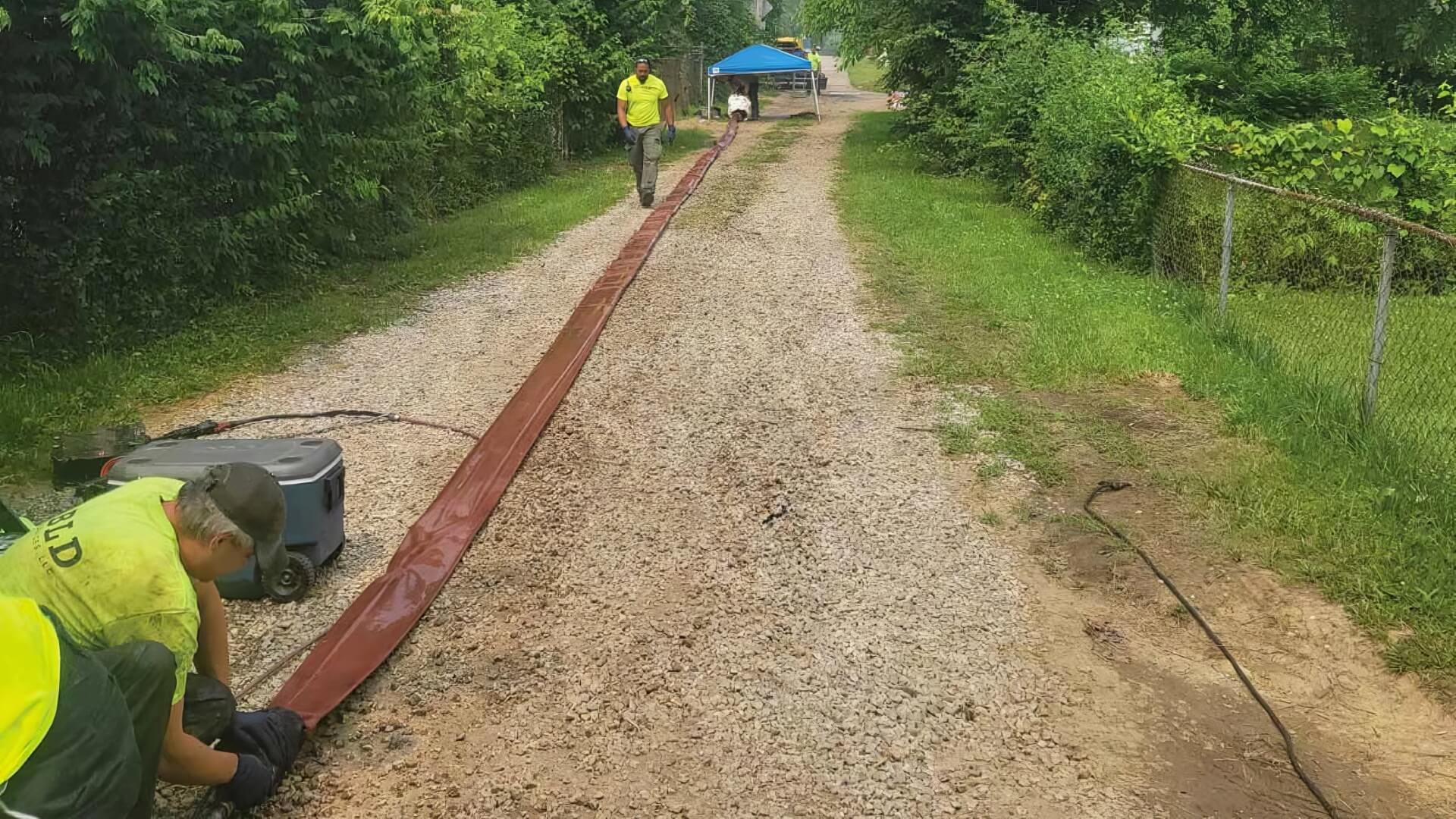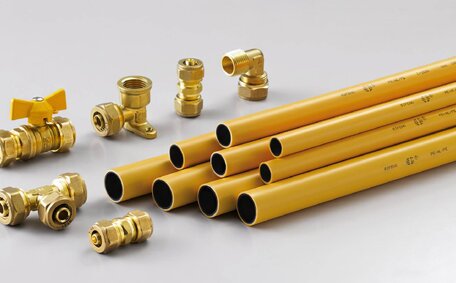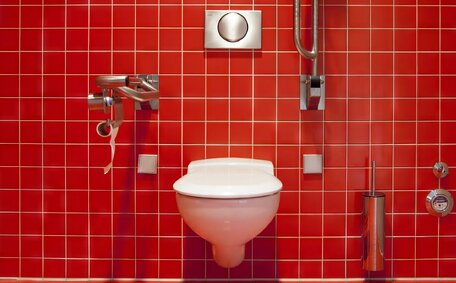Identifying Common Areas Where Hot Water System Leaks Occur
To detect leaks in your gas hot water heater, closely examine the following areas:
- The water storage tank itself is often a culprit where a leak can cause considerable trouble. Check for dampness or corrosion near the tank’s seals, joints, and connected fittings.
- Leaking hot water supply lines and fittings. Examine where the cold water inlet and hot water outlet pipes connect to the tank, as corrosion or loose fittings here are common culprits.
- The TP valve and connected drain valve. If the valve is faulty, it can cause instant hot water to leak from the drain pipe when pressure builds.
- Near isolation valves, evidence of a leak coming from valve glands or stem seals indicates they need replacing.
Use isolation valves to block water flow when inspecting solar hot water systems to identify leaks in your water heater. For safety, ensure you switch off the water supply and gas before inspecting the unit.
Piping within walls and under floors can be problematic if leaks occur. Signs of a hidden leak may be damp walls or an unexplained increase in water meter readings.
Water Lines and Pipe Connections
Connections to hot water heaters and their associated water heating lines are prone to leaking. Check these areas in gas water heating units for instant hot water issues:
- Inlet and outlet fittings on the tank, especially connections at the top of the tank, where leaks often occur. Loose, worn or corroded threads are the most common culprits.
- Pipe joints that have loosened over time.
- Cracks or holes forming in aged pipes.
Isolation valves near your unit and under sinks or showers can isolate hot water to a specific section for easier diagnosis.
For minor drips or weeping at joints or threads, Securing loose fittings may resolve minor leakage problems. Clear, non-hardening sealant tape can seal threads and minimise leakage.
If pipe sections have cracked/split or fittings have loosened significantly, they’ll need replacing. Copper and PEX (cross-linked polyethylene) pipes with compression or crimped connections are typical in modern houses.
When multiple pipes leak or you detect significant leaks, it’s wise Engaging a professional plumber to evaluate and update old piping is recommended.
Pressure Relief Valve
The pressure relief valve is a safety device designed to protect against water leaks that your tank can experience due to excessive internal pressure, usually above 500 kPa. It opens to release water and pressure if this threshold is exceeded, which prevents tank damage. This protects the tank from rupture or explosion, preventing water damage and injury risks.
Common reasons relief valves on your hot water tank fail and cause a hot water system leaking include:
- Age and wear that cause hot water system components to break down, including internal spring mechanisms.
- Sediment buildup hinders valve functioning, a problem exacerbated by excessive water pressure over time.
To test if the relief valve is faulty, consider what do you notice when you shut off gas and power, then lift the lever or press the button (depending on design). Replacement generally requires cutting the power supply to the unit, turning off water/gas, draining the system and dismantling the PTR pipework.
If water continues to leak after a test, this indicates replacement parts may be necessary. A licenced plumber can ensure your hot water system can cope with repairs done properly and safely.
Given their importance for safety, relief valves should be replaced proactively every 5-10 years. Inspect them annually and fix any drips immediately to help prevent bigger leaks from developing.
Understanding the Causes of Hot Water System Leaks
There are several key factors that can cause leaks to develop within hot water systems over time:
- Age and wear - Seals, valves and pipe connections degrade over the system’s lifespan. The average heater, when turned off still shows signs of leaking, may indicate it’s at the end of its lifespan and needs replacement.
- Sediment buildup - Mineral deposits and rust accelerating corrosion and wear of internal components.
- High water pressure - Excess pressure your hot water systems experience can strain pipes and seals, ideally they work best below 500 kPa (75 PSI).
- Improper maintenance - Failure to switch off your system, flush, inspect and repair issues promptly allows issues that a water system can be prone to, such as leaks to emerge.
Understanding how to fix leaks in your hot water system is crucial before attempting repairs. Simple fixes like tightening fittings may resolve minor leaks temporarily, but when you think leak identification is vital for a long-term solution, engaging a professional may be best.
A professional plumber can accurately diagnose and fix ongoing leaks, circumventing more serious damage.
Diagnosing a Hot Water System Leak
Follow these steps to systematically diagnose a leak in your hot water system:
- Comprehensively examine the hot water system for any signs of leakage, including dampness or water droplets on the tank, pipes, and fittings.
- Use isolation valves to shut off water supply to different parts of the system. Sequentially cut off water to different areas, checking for ongoing leaks to pinpoint the source.
- Check for leak your hot water indicator by monitoring the water metre when no water is being used. If it’s still running, a leak is likely, and it’s important to find out the precise issue. Compare usage to bills to estimate leak size.
- Use leak detection dye tablets in the tank then check connection points with a UV torch for dye traces escaping from hairline cracks.
- consider using a digital correlation leak detector. This amplifies and pinpoints the exact leak location by picking up the sound frequency of even tiny leaks.
- If you’ve isolated the leak but can’t resolve it yourself, it’s time to call licensed plumbers to properly diagnose via leak detection methods and rectify the issue.
Detecting leaks early and understanding the root cause leads to better repair outcomes. Don’t hesitate to utilise experts when needed - neglecting persistent leaks, even small amounts, inevitably leads to breakdowns and considerable water damage.
Simple Fixes You Can Do Yourself
Before seeking professional help, you might attempt a few basic repair tasks:
- Tighten any loose pipe fittings, joints or valve glands using an adjustable wrench. Take care not to overtighten.
- Replace the anode rod or old tap washers if taps are leaking. You need turn off the water first and check washers for wear.
- Add extra sealant tape to tighten weeping joints. Ensure connections are properly tightened first.
- Drain the tank and flush out sediment if the relief valve is leaking due to buildup.
DIY repairs might temporarily resolve minor leaks but won’t fix underlying issues. The underlying problem causing leaks can lead to more serious issues unless properly diagnosed and repaired.
If you can’t identify or fix a leak on your own, or if the leak persists after DIY attempts, seek professional assistance. Persistent leaks can rapidly escalate into major pipe bursts and water damage without proper rectification.
Knowing When to Call a Professional Plumber
There are several situations where it’s prudent to contact professional plumbers at Coogee Plumbing rather than attempting repairs on a leaking hot water system yourself:
- You cannot isolate or locate the source leak in a persistent hot water system issue.
- Simple repairs like tightening fittings and replacing washers haven’t stopped the leak.
- The leak is large, causing extensive water damage or flooding risks.
- Water pressure tests show pressure and water coming out exceeding 500 kPa (75 PSI).
- The expansion control or pressure relief valve needs replacing.
- Significant sections of pipework or fittings, which can deteriorate over time, require replacement.
- You lack the expertise, equipment or confidence to safely drain and repair the system.
Our fully licenced plumbers have the diagnostic technology, skills and experience to promptly identify and remedy persistent or complex leaks in your hot water service. We also offer preventative leak inspections, including leak allowance assessments, and maintenance plans to help maximise system life and avoid breakdowns.
For expert gas hot water system services, including leak detection and repair, contact our team at 1300 349 338. We are available 24/7 to help diagnose and resolve hot water system issues. Alternatively, email [email protected] or book an appointment online to arrange an on-site leak assessment.
Preventing Future Leaks Through Regular Maintenance
Performing regular maintenance and knowing what to do when checks to water mains are needed is essential to maximise the lifespan of your hot water system and prevent leaks.
Basic maintenance tasks to ensure the quality of provided by your hot water system entails:
- Flush out sediment by draining the tank annually.
- Inspect and seal pipe connections to prevent corrosion.
- Test the pressure relief valve to ensure it operates correctly.
- Monitor water usage to detect leaks and identify initial signs of water loss.
Professional leak detection inspections every two years are also advisable. Our licenced plumbers will:
- Thoroughly assess all system components for wear and damage
- Use advanced diagnostic tools to identify issues undetectable to homeowners
- Repair or replace ageing parts before leaks occur
- Adjust water pressure and install surge protection if required
- Provide maintenance advice tailored for your system/household needs
Routine upkeep prolongs your system’s life, prevents water damage, and minimises unexpected repair costs.
Contact Coogee Plumbing on 1300 349 338 to find out more about suitable hot water system maintenance plans for homes in the Coogee area.






